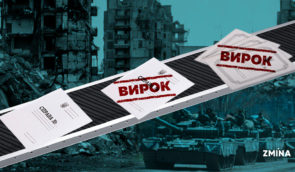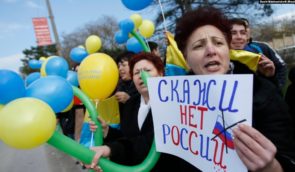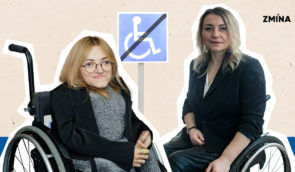On the way to ghetto, or How people are banned from speaking Crimean Tatar in Crimea

Crimean Tatar Rustem Seitov works as a hairdresser in Simferopol. He performs a ritual prayer in a specially designated place in the beauty salon five times a day. He often speaks the native language with his colleagues, Crimean Tatars, and customers who understand the Crimean Tatar language. It was so for six years, and it caused no particular difficulties in the work. It was so until recently.
According to Seitov, on August 18, the director of the salon, Natalia Radostina, scolded one of the employees, who spoke the Crimean Tatar. The employee swallowed the insult.
The next day, Radostina was told that Rustem also spoke Crimean Tatar. She summoned him to her cabinet and began to scold. The man put a bold face on and taped the entire conversation.
The director of the salon demanded that the man speak “Russian” at work. Rustem explained that he served the customers, who knew Crimean Tatar, so it was more convenient to speak their native language. Radostina did not want to listen to his explanations and insisted that the hairdresser spoke “plain language, Russian.” Moreover, if Rustem disobeys, he will be fired. “We’ll have to say goodbye to you,” the salon’s owner threatened.
Rustem resorted to the Crimean Contact Group for Human Rights seeking help.
Crimean Ombudsman: “Hasn’t he insulted someone by chance?”
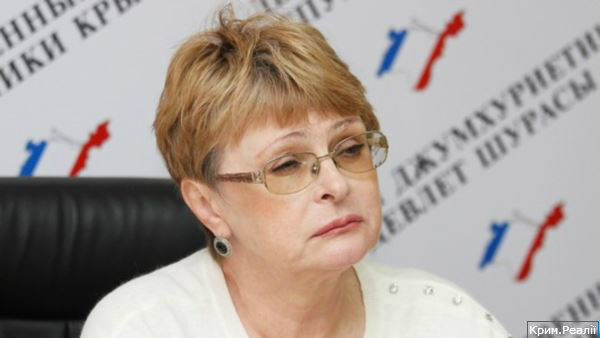
Transcript of the conversation between Rustem and Natalia Radostina as well as the story itself became headline-making in Crimea. Commissioner for Human Rights of the self-proclaimed government of Crimea, Ludmila Lubina, commented that this situation should be examined thoroughly. In particular, it should be found out whether the employee did not use the fact that the director of the salon doesn’t understand the Crimean Tatar language to “insult” her, the 15 minutes local newspaper covers.
These words rouse the indignation of the lawyers of the Crimean Contact Group for Human Rights and the human rights activists, who see not just a domestic conflict but discrimination on the grounds of language at least in this situation.
The lawyer of the aggrieved, Emil Kurbedinov, in a telephone call from Crimea said that he had already written complaints to the local authorities on human rights and to the prosecutor’s office.
“We want to find out their position on this issue whether they will find there violations of human rights, in particular the violation of his rights in a rude manner and the prohibition to speak his native language, threatened with dismissal… Rustem also performed ritual prayer five times a day and that caused no problem. However, if he continues to speak the Crimean Tatar, he will be banned from praying at work,” the lawyer says.
According to him, Rustem is not going to leave the peninsula, he wants to continue living and working here.
“But we want to put a logical end to this injustice, to put it mildly. Or they will officially apologize to Rustem and compensate the moral damage, or we’ll work in the other direction,” Emil Kurbedinov notes.
He says that the words of the local ombudsperson Lubina are unacceptable.
Kurbedinov also adds that his client was summoned to the representative office of the Russian Federation. They talked to him for about ten minutes, asking where the complaints were filed to and whether there are any answers.
“They asked whether we had the tape. We said yes. This “unnoticeable case” has been so widely discussed because we have evidence,” the lawyer stresses.
Rustem continues working, but there is tension in the air.
“There is a sort of segregation in Crimea…”
Chairman of the Crimean Contact Group for Human Rights Abdureshyt Dzheparov notes that such cases of discrimination on grounds of language, religion and ethnicity are common.
“There is a sort of segregation in Crimea… We may finally get the situation when one recreational and cultural institutions may be for one people, while the other will be for other people as it was in the middle of the last century in the United States. Of course, these cases are rare and yet invisible, but … For example, the administration of various schools now increasingly often ban the children from communicating their native language in the classroom and during the breaks,” Abdureshyt Dzheparov says.
“…You have no right to study Tatar because you are not Crimean Tatar”
The author of the article has a transcript of conversation with the Crimean Tatar woman, the mother of two high school students from the village, where the Crimean Tatars account for 70% of its inhabitants. Another woman is also involved in conversation. The mother asked not to reveal her name and the area of residence not to do harm to the children.
This woman wrote a statement in the school to let her children study the Crimean Tatar language. Another woman, sitting nearby, also wanted to write the same statement but the teacher told her, “the principal said that you had the right to study only your native language: Tatars study Tatar, Russians study Russian, Ukrainians study Ukrainian. We now don’t have the teacher of the Ukrainian language, Russian is taught for all, and you don’t have the right to study Tatar because you are not Crimean Tatar…”
Mother: The Crimean Tatar language is not a discipline now, it’s an additional course. We even don’t have books.
Journalist: Wait, did you have the books earlier?
Mother: Yes, we did.
Journalist: Where are they now?
Mother: The say Russia hasn’t delivered. They have no books…
Another woman: They disposed of the books along with the Ukrainian books. The books were burnt. All the Tatar books were seized from schools.
How should Ukraine respond?
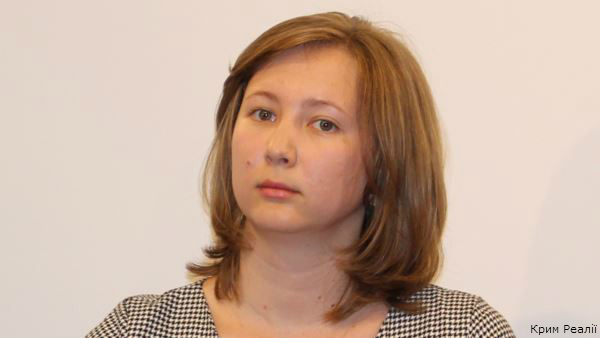
Deputy Chairman of the Crimean Field Mission Olha Skrypnyk, commenting on the situation in Crimea, says there have been many examples of discrimination over the last year.
“We may say it is systemic discrimination on ethnic and language grounds, first and foremost. The two groups, the Ukrainians who speak Ukrainian and representatives of the Crimean Tatar people, have been affected,” Skrypnyk says.
The discrimination on political motives happens quite often also. For example, the people coming out with the Ukrainian flags have been recently arrested, although it’s not a violation under the Russian law.
The Crimean Field Mission has also recorded closing of Ukrainian schools, Ukrainian classes, different cultural institutions, such as museums, the department of the Ukrainian philology was also “reformed.”
Olha Skrypnyk is convinced that Ukraine should realize that despite the events in Crimea, the two million Crimean Tatar people, who stayed there, are citizens of Ukraine.
The public authorities cannot operate in the territory, which is now not controlled by Ukraine. So, moreover, Ukraine should create appropriate conditions for the inhabitants of Crimea on the mainland territory at least. This also refers to the issues of education, distance education, issuance of official documents on academic degrees and so on.
“If to speak about certain legal actions, the Prosecutor’s Office of the Autonomous Republic of Crimea operates in Kyiv. Its task is not just to record the violations of human rights, but also to give a legal assessment. In particular, to initiate the criminal proceedings. The prosecutor’s office of the Autonomous Republic of Crimea has the relevant powers to do that,” Skrypnyk explains.
The expert recalls the events of this spring, when Leonid Kuzmin, the teacher of history, was fired from his job because he had held the action to mark the anniversary of Taras Shevchenko’s birthday.
“He was fired because of his because civic stance. The Prosecutor’s Office of the Autonomous Republic of Crimea in Kyiv opened the criminal proceedings. It gives Ukraine the opportunity to bring perpetrators to justice. The problem is it can’t be done in the territory of Crimea now, but the situation is changing. The main thing for Ukraine is to act in a lawful manner where such an opportunity arises,” Skrypnyk said.

